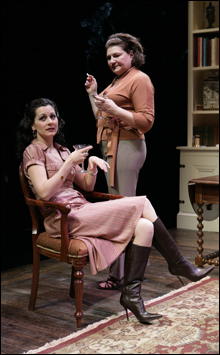
CAN A PULITZER WINNER BE UNDERRATED?: In a word, yes. |
Harold Pinter once said that his plays were about “the weasel under the cocktail cabinet.” That’s an excellent description of Edward Albee’s 1967 Pulitzer Prize winner, A Delicate Balance, which is enjoying an expertly acted revival at Trinity Repertory Company (through March 25). In the Trinity production, the cocktail cabinet, though physically upstage, is at the thematic center of what appears to be a drawing-room black comedy but whose weasel is existential terror. At the well-appointed home of Tobias and Agnes, family friends Harry and Edna turn up like Sheridan Whiteside in The Man Who Came to Dinner. But they’ve come because they were sitting at home, not up to much, when suddenly they felt “frightened” to the point of having to cut bait and run. Will their long-time fellow-WASP country-club chums take them in?But back to the cocktail cabinet, a frequent fulcrum of Albee’s plays — including the more lacerating and allegorical Who’s Afraid of Virginia Woolf?, for which this play, albeit written four years later, seems a sort of study. At one point in Balance, the liquor cupboard is defended as if it were a fortress, with Tobias and Agnes’s adult daughter, Julia, repelling any effort by non-family-members to get near the source of what Agnes’s alcoholic sister Claire calls “succor.” Still, if the blood-alcohol level here suggests O’Neill, the lurking subject matter and sometimes the terse, magisterial cadences are redolent of Beckett.
It may sound silly to say of a play that won a Pulitzer that it’s underrated, and this one did enjoy a Tony-winning 1996 Broadway revival. But Balance, bullied into a corner of Albee’s more realistic middle period by Virginia Woolf?, doesn’t get its due. Sure, it’s less visceral than the monumental marital slapdown of George and Martha, with a lot more left unspewed. But as it marches from genteel banter toward a touching climax pushed under the rug, the play shines a keen light on the mist of regret that mounts up around a life. And Kevin Moriarty’s production, if deployed on a busy set evocative more of America’s middle than its upper class, captures both the loneliness and the wit in Albee’s tragicomic peel of the wallpaper covering human need.

The play opens on Agnes and Tobias tippling cordials. And though the atmosphere is terribly civilized, one knows not to look for Noël Coward since Agnes’s somewhat stilted conversation centers on the intriguing possibility that she might one day lose her mind. Always in command, the pleasant mom her daughter calls a “drill sergeant” never does. But she and Tobias have suffered loss, politely buried, along with the past infidelities hard-drinking Claire loves to kick the sand off. And in the course of the play, Tobias, trying to hold roiling family and friends together, will suffer the death of a few more illusions, among them the notion that no man is an island. Whereas he sees the intrusion of unlikable Harry and Edna, bearing their free-floating anxiety, as an opportunity for human connection, the intruders are to others — and to themselves — carriers of a “plague” to which we are none of us “immune.”
With five of its six characters middle-aged, A Delicate Balance plays to Trinity’s strength, a core of seasoned thespians who include Timothy Crowe, a suavely suffering Tobias whose last-scene dissolve into desperation is beautifully modulated; William Damkoehler, who captures Harry’s frank, nervous dullness; and Cynthia Strickland, a serenely smiling vampire of an Edna. The warm Janice Duclos is oddly cast as Agnes, but she brings a smug sunniness that leavens the assured maternal martinet. As chronic brat Julia, returned from her fourth marriage to assault the bosom of her nuclear family, Angela Brazil gives a funny, neurotic performance in which the marriage of adorability to obnoxiousness is more successful than any of Julia’s. And as gleefully “willful” Claire, knocking back liquor as she knocks off one-liners, Anne Scurria displays timing as adroit as her cocktail-party trick with brandy glass affixed to furrowed forehead. Talk about a delicate balance.